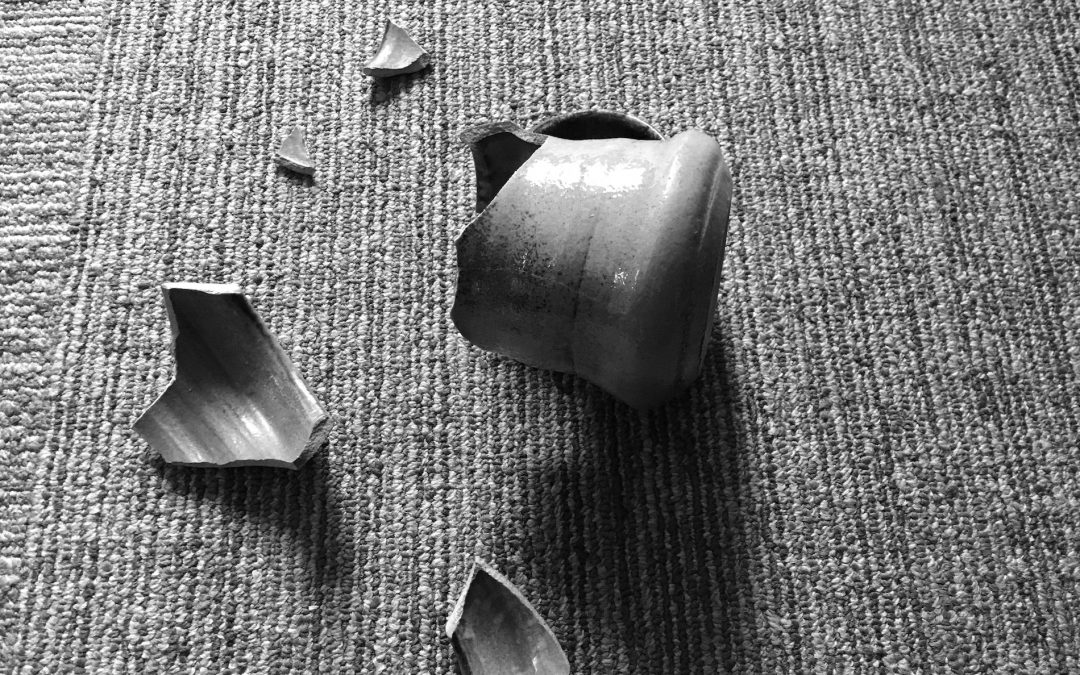So this morning I broke my mug. Not a big deal, right? Well, I had always considered this mug a bit “special.” It was handmade for me dating back almost 15 years! Yes, I enjoyed many a cup of joe in various states, settings, and moods. All of which came to an abrupt end when I incidentally knocked it from it’s resting spot.
I mean c’mon, the shelf was only about two feet, and this mug (actual mug pictured above) is not exactly a delicate piece. Non-the-less, as I stared, in somewhat a state of disbelief, I tried to consider the situation in terms of time tenses. More specifically, the present moment. The mug is broken – that is the incontestable objective statement. The “stark statement” as one of my patients says.
It’s the reality of the situation and of the present moment void of judgement or context.
I was struck that anything I add to that objectiveness is context or judgement informed by the past or future. If I think it sucks that I will never again enjoy my morning coffee and Twitter time sipping from this mug, that is solidly considering the future. And, if I loose sleep over the fact that only this morning I enjoyed a well crafted french-press brew, that is firmly in the past.
There is also nuance of the present objectiveness to consider. For instance, noticing that there are five distinct pieces now to the mug, determine the various shapes of the pieces, the distance covered by each scattered piece, etc.
*And a more philosophical consideration of whether this object is still a mug, or if the now separate objects constitute something other than a mug, or make up a broken mug? And what of the tiny pieces not seen – are these needed to constitute the concept of a mug given that perhaps a necessary aspect of mugs is that they don’t leak, and with missing pieces this mug would most certainly leak?
Perhaps considering the nuance of the objectiveness is what proves helpful in not becoming consumed with the past or present.
You don’t even necessarily need to develop the philosophical depths of forms, or types and tokens. We can force ourselves to remain in the present (and therefore unaltered emotionally), by focusing on the present. Maybe not much novelty here, but try it. Realize there is a bouncing that occurs between the various states of time, and then try to manipulate the sequencing.
This is a microcosm of what many others have already stated, but given the immediate emotional response, I considered it a prime time to reflect on these various time tenses. Specifically noting the power of the present – or lack of power (with regard to emotion).
So an obvious question becomes what to do with the past or future? What about the present you ask? Well,
there is nothing to do with the present – strive to experience it.
The past can be reflected upon and gratitude can be given for the experiences already had. Or if the experiences were not particularly enjoyable, it can be understood so as to avoid a repeat experience in the future. And what of the future? Lamenting what cannot be is wasteful. Ah, stoicism, our faithful companion. More productive is to consider alternatives. The chance to obtain a new mug? Future enjoyment from this yet to be obtained coffee vessel and what adventures it may offer. Much more enticing thinking.
So I cautiously picked up the pieces, considered a wabi-sabi self project for a moment, then tossed them in the trash.

